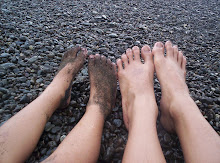
Anansi Boys by Neil Gaiman
While living in London, Fat Charlie learns that his father had died. He travels back to Florida for the funeral, and he learns that his father is a god, he has a brother who has inherited all the god-like magic, and he could call on this brother by telling a spider. Right. Impossible.
Except that Fat Charlie, while a little bit drunk, does tell a spider that he wishes to see his brother. And he arrives, a witty, charming man who called himself Spider.
Spider proceeds to wreck Fat Charlie's life. He installed himself in a spare room in Fat Charlie's house, a room that was just a closet, but when you opened the door you'd see that he has a waterfall right outside his window, a jacuzzi, and a fierce sound system. He got Fat Charlie into some trouble at work, and the police were involved. Worst of all, he made Fat Charlie's fiancee believe that he was Fat Charlie, and succeeded in sleeping with her.
Of course Fat Charlie was angry. He went back to Florida and got help in getting rid of Spider, which means he had to deal with the gods himself. He had to mess with a little magic himself.
Tangled in it all was Fat Charlie's former employer, who was a crook and a murderer. He fled to St. Andrews, an island famous for having no extradition treaties and lots of ways to hide money. That is where they would all resolve the problems. And let's not forget the little love stories. You'll have Rosie, Fat Charlie's fiancee, and Daisy, the policewoman, and it's nice to see who ended up with whom.
Anansi is one of the most important characters of West African and Caribbean folklore. He is witty, and funny, and a trickster. He is a spider. All the stories belonged to him. There was mention of him in another Neil Gaiman novel, American Gods. And this story about his sons is slightly whimsical, slightly scary (there's a part where hundreds of birds come out of a woman's mouth), and totally enchanting.





















